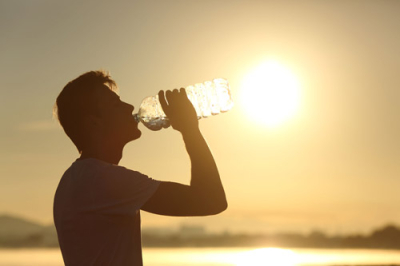Why is it important to stay hydrated in the summer heat?

It is imperative to ensure good hydration in the summer to make up for the sweat loss. This is more so when you are outdoor playing. Low water intake can pose challenges such as creation of extra heat in the body leading to acidity, constipation, and dehydration.
"Staying hydrated is important not just for children but for all age groups. It ensures normal fluid and electrolyte balance which helps to keep you active and going all day long," says Dr. Arjun Verma, Consultant Paediatrics and Neonatal, Artemis Hospital, Jaipur.
Elevated temperatures and heat waves increase sweating, leading to immediate loss of sodium and water from the body. Hence electrolytes are taken. However, the downside here is if there is an increased intake of sodium, you may experience hypernatremia (a condition wherein the sodium in the body is high). Symptoms of hypernatremia include decreased activity, lethargy, fainting, palpitation, headache and migraine. So, we need to avoid electrolyte disturbances which may lead to mild to severe symptoms mentioned above, he says.
Preparing ORS at home
Dehydration should not be taken lightly. If you feel you are dehydrated, tell your parent to take you to the hospital. "In case of dehydration, homemade ORS (oral rehydration solution) or commercial preparations can be taken en route to the hospital. ORS can be prepared at home by dissolving 1 tablespoon of salt in one litre of water and taken in sips," says Dr. Parimala. V. Thirumalesh.
Hydration keeps the skin replenished, glowing and supple and helps the kidney function well. It can also help relieve constipation.
Effects of dehydration
When you play outside while dehydrated you can face serious problems. Some of the serious effects of dehydration are seizures, low blood volume, swelling of the brain and even kidney problems. You will know you are dehydrated when there is little or no urine output in a 12-hour period, when you have dry mouth and when your eyes are sunken in. "The signs of dehydration are increased thirst, irritability, tiredness, sunken eyes, loss of skin turgor or elasticity. Normally, if you pinch the skin and release, the skin gets back to shape within 2 seconds. If dehydrated, it takes a longer time which is called loss of skin turgor," says Dr. Parimala V. Thirumalesh, Senior Consultant, Neonatology and Paediatrics, Aster CMI Hospital, Bangalore.
"Children under 3 years of age need 4 cups of water a day which is roughly a litre. Older children need to drink 7-8 glasses of water," says Dr. Parimala V. Thirumalesh. To prevent dehydration, develop a habit of drinking water regularly, she adds.
"Roughly, the 2 litres of water per day can include water every 4 hours (morning at least 2 glasses of water on an empty stomach), home-prepared fruit juices, coconut water if available (this will do wonders to your hydration), milk shakes, etc.." says Dr. Arjun Verma.
To prevent dehydration, avoid too much of outdoor sports or roaming in the sun, apply sunscreen lotion before stepping out, ensure at least 2 litres of water intake per day, always keep a water bottle in your bag when you go out for fun or study, and wear light coloured clothes, he says.
Hydrating refreshments
Here are some liquid refreshments that will not only quench your thirst but also keep you healthy.
Smoothies are an interesting variant of the plain, boring milk. Packed with nutrients, protein, vitamins and antioxidants, they help you kick-start your day with vigour. Take them along with your breakfast or evening snacks.
*Buttermilk is an all-weather drink that aids in digestion. Thirst quenching and inexpensive, this drink is easy to prepare at home.
*Apart from being a low calorie beverage, coconut water is packed with a lot of nutrients, vitamins, minerals and antioxidants.
Aam Panna is a refreshing drink made of raw mango that is sweetened with jaggery or sugarcane juice.
*Slices of cucumber can be added to a jar of lemon water and taken.
Tips to follow in summer
*Drink a glass of water before play. Avoid too much of outdoor sports.
*Take water breaks at 30-minute intervals.
Apply sunscreen lotion before stepping out.
*Wear loose-fitting and light coloured clothes.
Eat hydrating foods such as watermelon, grapes and orange.
Picture Credit : Google